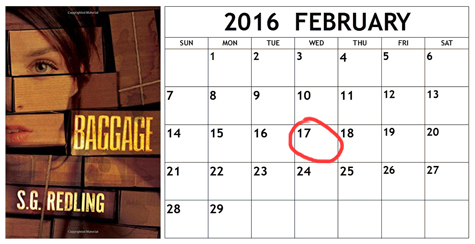
I would already be home if I would stop turning around to stare. Cold drizzle soaks through my jeans and my ponytail has taken on so much water it whips like a sprinkler when I turn my head but I keep turning to look. I’ve seen it nearly every day for six months and I still try to take it all in. After all, the world ends tomorrow. Again.
So begins Baggage, the story of Anna Ray, to whom horrible things happen on February 17th.
There are a lot of ways to use time and place for effect in thrillers. We’ve all enjoyed brilliant ticking clocks, and lost ourselves in settings so rich they seem characters unto themselves. But in Baggage, I wanted to use time differently. I wanted to burden my main character with the weight of ghosts that have an overdeveloped sense of punctuality.
The book begins on February 16th, the eve of the awful day. In truth, at this point, that date has proven fateful only twice in her young life—once in her childhood, and a year before the story starts. Once we learn the nature of the two events, however, it’s clear that two is enough for anyone. So, of course there will be a third.
What is it about February? (Those of you who live in sunny climates can just skip this part. We in the land of snow and ice probably aren’t speaking to any of you anyway.) It’s the shortest month of the year, as if even the Calendar Police couldn’t justify giving us one more day of that crap. There are no major holidays. For the most part, all there is to look forward to is half-priced chocolate on February 15th and getting your taxes ready. Woohoo!
But dreary and unexciting are not the same as dreadful.
While very few people probably enjoy February, there are no general nightmares inherent to it. My challenge was weighting that particular date down with enough pain to make the reader feel it without dragging out a calendar and laying it all out in exposition.
I decided to do with Anna what so many of us do in our own lives—I have her attempt to ignore it.
Have you ever tried to ignore something? It’s like giving it a soul transfusion—all your energy flows into it, expanding it, and giving it teeth. This happens when we ignore people, and fights, and bills, and responsibilities. The difference with trying to ignore a date is that there is no escaping the calendar. There is no place on Earth where February is not happening.
And unlike bills, people, and fights, February will keep coming back, on schedule, over and over again. You can see it coming a mile away, and there isn’t a damn thing you can do to stop it.
This is the awful sweet spot of the story. Baggage is about the damage of grief—the danger of not addressing it, facing it, and finding a place for it—because, like time, grief marches on. It won’t be ignored; it won’t go away. Instead, it will bind itself to time and morph into a dark beast that marches on and on, regardless of your plans.
Anna Ray can’t face that. Or maybe she’s chosen to live with the beast of pain that rides in on the shoulders of February. She seems to think she can withstand these confrontations forever.
That is, until February 17th delivers another murder, grisly and personal. Grief and February have upped their game and upped the stakes. Now, February 17th means more than grief, more than pain, more than loss. Now it means danger. Now it means that after all the suspicious deaths Anna Ray has been witness to, February 17th has finally transformed her into a suspect.
Dates on a calendar are like hours on a watch. They’re just numbers—an arbitrary way humanity tracks our passage around the sun. We assign weight and meaning to these dates. We declare this one a feasting day, this one a day to set stuff on fire, this one a day to elect our officials. It’s a system that works, until damage, pain, and grief stake their own claim on a date. In Baggage, Anna Ray must face the curse of February 17th.
The question is:
Who is making that decision?
Copyright © 2016 S.G. Redling.
To learn more or order a copy, visit:
opens in a new window![]() opens in a new window
opens in a new window![]() opens in a new window
opens in a new window![]() opens in a new window
opens in a new window![]()
S.G. Redling is a fifteen-year veteran of morning radio, an avid traveler, and a so-so gardener. She currently lives in her beloved West Virginia.
